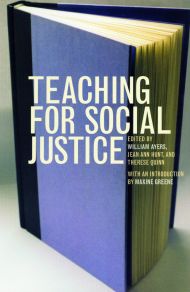 One of the leaders in Teaching for Social Justice is William Ayers, who is a Distinguished Professor of Early Childhood Education at the University of Illinois at Chicago. Ayers was also a member of the Weather Underground in the 1960s/70s, who participated in acts of terrorism including planting a bomb in the Pentagon.
One of the leaders in Teaching for Social Justice is William Ayers, who is a Distinguished Professor of Early Childhood Education at the University of Illinois at Chicago. Ayers was also a member of the Weather Underground in the 1960s/70s, who participated in acts of terrorism including planting a bomb in the Pentagon.
In the book Teaching for Social Justice: A Democracy and Education Reader (New Press, Spring 1998), which I bought and read, Ayers and other teachers and professors outline Best Practice methods for teaching social justice. This would also be a good read for a criminal justice degree class. (There are also numerous books, groups, associations, and conferences today that deal with Social Justice and take their lead from Ayers and Howard Zinn.)
Here are some of the highlights:
Ayers in his “Introduction” proclaims, “The teachers [of social justice] … reject the old objectivist approach” to teaching and replace it with the values of social justice where all around us are nothing but injustices such as racism, sexism, classism, ect. Lots of “isms” which the teaching of Social Justice seem to use. All around us, according to this view and this instruction method, is inequality and oppression. As I have already pointed out here and here, their goal is not objectivity or neutrality in the classroom. They are the disciplines of Howard Zinn and believe that objectivity is irresponsible when faced with the supposed racist and oppressive society we live in. Remember, it is so bad here in the United States, in terms of injustice, that people from other countries are flocking here?
Everything, every topic, seemingly falls under the umbrella of “Teaching for Social Justice.” For example, Environmental Justice is a large part of it as well as Economic Justice, and this ultimately leads to the teaching of socialism and the redistribution of wealth, energy, and resources. William Ayers clearly states it is their goal to educate through “collective action” and for the good of the collective. All under the guise of teaching for “social justice and democracy.”
The book also talks openly about the “Progressive” origins of the movement going back to the Progressive Education Association of the 1930s. The book is filled with nuances of “collective undertaking” and social reform for the greater good. The themes of socialism and progressivism are right there, openly encouraged and acknowledged. No conspiracies, as conspiracies are “secret” designs and not out in the open. This is a movement for “change,” and one we can believe in.
“In the course of the past twenty years, American history has been remade. Inspired initially by the social movements of the 1960s and 1970s – which shattered the ‘consensus’ vision that had dominated historical writing – and influenced by new methods borrowed from other disciplines, American historians redefined the very nature of historical study.” ~ Eric Foner
William Ayers is a unrepentant terrorist, who engaged in bombings in the early 1970′s. He should have served jail time for his violent activities, however he beat the rap and is now a “social justice” educator. It is a shame that teachers have listened to anything that this man has said about teaching pedagogy because as this reviewer points out it is all about, essentially, advancing socialist propaganda in the name of “social justice”. Advancing an agenda to alienate young people (by teaching them that their nation’s history is just a long list of genocide, oppression, and injustice) from a reasonable pride for their nation is a betrayal of the teaching profession and the civic mission of public schools. It is outrageous that he is given any respectability at all by teachers or their professional organizations.
I may or may not read the book. I did read the H. Zinn book and yes he takes a very clear political slant. Personally I was not threatened by what or how he described events. They all occurred. His description of the historical event many times was from the perspective of the group that was not in “power” over the event. Some people have described it as history from the “little man or unempowered” perspective.
The taking Collective action for the greater good is actually that is how I interpreted the Greatest Generation by Tom Brokow, people willing to work collectively to accomplish something far greater, winning World War 2, getting the economy moving once more.. What I do find interesting is how the Texas school text book controversy seems to mirror this.
One of my interests in history has been on identifying for specific time periods. What elements influenced each other that new philosophies or values developed during the Time Period? So I am interested in the Enlightenment Period how it impacted the development of the United States or the French Revolution. The post World War 2 period that I believe saw an introduction of new values and cultural philosophies develop. The philosophies that developed back in the late 1950’s are still influencing how society views education, politics and social norms.